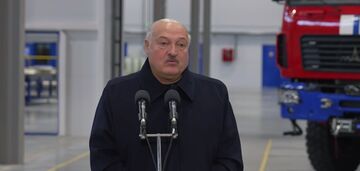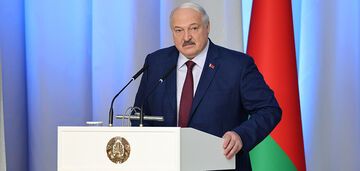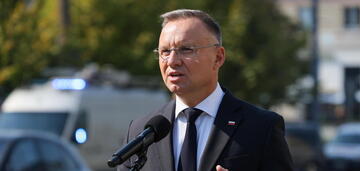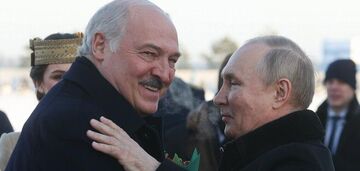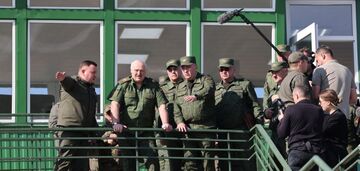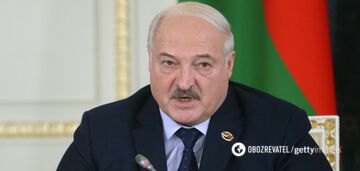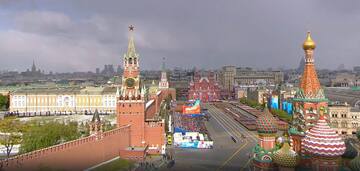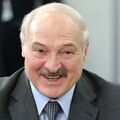
Alexander Lukashenko
Born on August 30, 1954 in the settlement of Kopys, Orsha district, Vitebsk region. He grew up and was brought up without his father.
In 1975 graduated from the historical faculty of Mogilev Pedagogical Institute as a teacher of history and social studies. 1985 - Belarusian Agricultural Academy (economist of agricultural production).
After military service he worked in the Komsomol and party organizations, in economic positions of enterprises of industry of building materials and agroindustrial complex of the Belarusian Soviet Socialist Republic. From 1977 to 1994, he was a secretary of the Komsomol committee of Mogilev municipalpischetorg, deputy chairman of the collective farm "Drummer" in Shklou district of Mogilev region, deputy director of the building materials factory in Shklou, secretary of the collective farm "Lenina" and director of the state farm "Gorodets" in Shklou district.
In 1990 became a deputy of the BSSR Supreme Soviet. He was the only MP who voted against ratification of Belovezh Agreements that abolished the Soviet Union. In 1993 he headed the temporary parliamentary anti-corruption commission established to investigate the activity of commercial entities in the state bodies.
In 1994 he was elected president of the Republic of Belarus for the first time. Received more than 80 percent of the electorate votes. Outmaneuvered in the race five competitors (including the chairman of Supreme Soviet Stanislav Shushkevich, who together with Yeltsin and Kravchuk "dissolved" the USSR and "established" the CIS).
During the national referenda of 1995 and 1996, initiated by Lukashenko, decisions concerning the Russian language status of the state language, economic integration with Russia, introduction of new state symbols, the President's right to dissolve the Parliament in case of its violation of the Constitution, and the Presidential draft Constitution were adopted.
In April 1996, elected as Chairman of the Supreme Council of the Union of Belarus and Russia.
In 2001, elected for the second term as President of the Republic of Belarus. He got 75.65% of the votes.
As noted on the website of the Belarusian president, "people appreciated the work of the head of state, and in 2005, at the referendum the people voted to give Lukashenko the right to participate in the presidential election in 2006. Western countries gave a hostile reception to the "dragged through" decision on Lukashenko's third term.
In March 2006, with 83% of the vote, the Belarusian president was elected for the third time to the highest state office. According to official Minsk, this happened "despite unprecedented external pressure and attempts of several countries to openly interfere in the internal affairs of Belarus.
For a long time the West boycotted the official Minsk, and Lukashenko and his associates were forbidden to enter EU countries and the USA. Only in October 2008 the EU decided to suspend the ban for half a year for the President and some other representatives of the Belarusian authorities in response to the recent release of political prisoners. At the same time, the restrictions remained in force in respect of the leadership of the Central Election Commission of Belarus and those suspected of involvement in the disappearances of Belarusian opposition activists in 1999-2000.
December 19, 2010, the next presidential election was held in Belarus. On December 20, the CEC announced that Lukashenko had been re-elected for a fourth term with the result - 79.65%. The elections were recognized neither by the other presidential contenders, nor by the U.S. and Europe, in contrast to the CIS mission that was present at the election. The U.S. specifically noted that it: "strongly condemn the actions of the Belarusian government in undermining the democratic process, as well as the disproportionate use of force against political activists, civil society representatives, and journalists."
On October 11, 2015, the fifth presidential election was held. A total of four candidates were registered, of which only Lukashenko won more than 5%. The elections ended in one round and Lukashenko won with a result of 83.49%.
The international observers stated that the main violations of the elections were problems with access to polling stations, lack of opportunity to monitor the sealing of ballot boxes and the use of administrative resources. They also criticized the non-transparency of the early voting procedure, which they called "voluntary and compulsory".
Lukashenko, as president, is Commander-in-Chief of the Armed Forces of the Republic of Belarus, and also heads the Security Council and the National Olympic Committee of Belarus.
Alexander Lukashenko is often referred to in the Western media as "Europe's last dictator. U.S. Director of National Intelligence James Clapper wrote in his report that Lukashenko is driving Belarus further and further away from the West and pushing it into economic dependence on Russia, thanks to whose generosity Belarus maintains a relatively stable standard of living despite the shortcomings of a centralized economy. PACE member Christos Pourgourides accused the Belarusian authorities of killing and disappearing local politicians.
During Lukashenko's rule political and some personal freedoms of citizens were restricted in Belarus. The independent press was consistently destroyed and political opponents were persecuted. Some political and personal enemies of the President of Belarus have disappeared. Many politicians and active young people were forced to emigrate to other countries.
Lukashenko and Ukraine
In 2014, Lukashenko called the political situation in Ukraine a "catastrophe" and accused the fleeing Yanukovych of being to blame for the Revolution of Dignity.
During his meeting with Turchinov, Lukashenko expressed his opinion about the annexation of Crimea by Russia, stating that one should fight for his land, while the Ukrainian authorities virtually ignored the circumstances.
As for the invasion of Donetsk and Lugansk regions by Russian occupants, Lukashenko said there was no war, Russia had nothing to do there, and the blame was put on the actions of politicians "because of whom the unity of the country was broken." He also said that the fighters fighting in Ukraine must be destroyed by all means.
Many Russian, Ukrainian and European media interpret Lukashenko's words about the development of relations with Ukraine and Russia differently.
On October 10, 2018, Lukashenko ruled out the possibility of Belarus becoming part of Russia.
In the same month, Lukashenko said that Belarus was ready to help resolve the military conflict in Donbass because "innocent people" were dying there.
At the Munich Security Conference, Lukashenka threatened a joint response with Moscow to the placement of a U.S. base in Poland.
In November, Lukashenka said he was against the establishment of military bases by NATO countries, because he did not benefit from a sharp deterioration in relations with Russia. Igor Tyshkevich, an expert at the Ukrainian Institute of the Future, said that Lukashenko is trying to balance the interests of different states.
In December 2018, Lukashenko and Putin had a heated argument at a meeting. The president of Belarus drew attention to the different conditions for gas consumers, with fuel costing $130 per thousand cubic meters for Belarusians and $70 for Russians (in the neighboring Smolensk region). After the meeting, Lukashenka had to publicly apologize to the head of the Kremlin.







